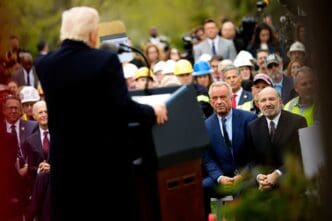Facing a challenging political landscape following electoral setbacks in Wisconsin and Florida, President Donald Trump has intensified his economic strategy, implementing stringent new tariffs on imports from numerous U.S. trading partners. This move signifies a pivotal moment in Trump’s presidency, showcasing his commitment to a protectionist foreign policy that he has advocated for over four decades.
The president’s decision to impose these tariffs represents a bold assertion of his belief that free trade has been detrimental to the U.S. economy, which has shifted from manufacturing to services. This approach, reflecting Trump’s instinctual leadership style, marks a significant departure from the more restrained policies of his first term. The consequences of these tariffs could be a defining factor of his presidency.
The immediate reaction to the tariffs has been concerning. Financial markets experienced their worst downturn since the COVID-19 pandemic, with foreign trade partners retaliating and economists warning of potential inflation and recession risks. While Republican lawmakers express unease about the party’s future, Democrats feel invigorated, perceiving Trump’s actions as overreach.
As a response, Democratic activists are organizing rallies nationwide, potentially the largest since Trump’s return to office. Despite these challenges, Trump remains steadfast, asserting that the tariffs will revitalize domestic manufacturing and help extend his 2017 tax cuts. He maintains optimism about the economic outlook, even as the stock market experiences significant declines.
Trump’s tariff policies have previously prompted international negotiations, but the current situation has led to significant retaliation from China and resistance from European allies. Some of Trump’s supporters, like Frank Amoroso from Michigan, express concern about the short-term economic impact but remain hopeful for long-term benefits.
Republican Representative French Hill has voiced reservations about the broad tariffs, advocating instead for focused trade negotiations with Canada and Mexico. Despite differing opinions within the Republican Party, many in Trump’s base continue to support his vision, believing in the necessity of temporary economic disruption for future prosperity.
Meanwhile, Democrats are gaining momentum, buoyed by recent electoral successes and a renewed sense of purpose. The decisive victory in Wisconsin’s state Supreme Court election and New Jersey Senator Cory Booker’s impassioned speech call for unity and action among Democrats. This resurgence is seen by some as a potential catalyst for the Democratic Party’s comeback.
Progressive groups like Indivisible are optimistic about the political consequences for the GOP, suggesting that Trump’s tariff policies could lead to significant electoral shifts akin to historical precedents.
Our Insights
International relations may experience increased tension as nations respond to the newly implemented tariffs. This could complicate diplomatic efforts and strain existing trade partnerships, as countries reassess their economic strategies in light of potential retaliatory measures. Such developments might hinder cooperative initiatives in various sectors, including trade, security, and environmental issues.
The newly implemented tariffs are likely to result in higher consumer prices, which would directly impact the everyday expenses of American households. As businesses adjust to the increased costs of imported goods, these expenses may be passed on to consumers, leading to higher prices for a range of products, from electronics to household items. This rise in costs could strain household budgets, reducing disposable income and potentially affecting overall consumer spending. In the long run, sustained increases in prices may alter consumption patterns and economic behavior, further influencing the financial wellbeing of families across the country.
Businesses that depend on imported goods are likely to encounter increased operational costs due to the new tariffs. These rising expenses can constrict profit margins, leading companies to make difficult decisions regarding pricing, hiring, and investment. As operational costs escalate, there is potential for businesses to delay or reduce hiring, which could stifle employment growth. Additionally, wage increases may be limited as companies seek to manage their financial pressures.
Local economies that are heavily reliant on trade may experience a decline in economic activity and job opportunities as a result of the new tariffs. Reduced trade flows can lead to decreased demand for goods and services, impacting businesses that depend on exports or imports. This downturn may result in lower revenues for local enterprises, which can, in turn, affect their ability to maintain staffing levels or invest in growth.
The introduction of new tariffs may alter political dynamics by influencing voter sentiment, which could have implications for upcoming elections at multiple levels. As constituents react to the economic effects of the tariffs, including rising prices and potential job losses, their perceptions of elected officials and political parties may change. This shift in public opinion could affect campaign strategies and priorities as candidates address voter concerns about trade policies and their impacts on local economies.








